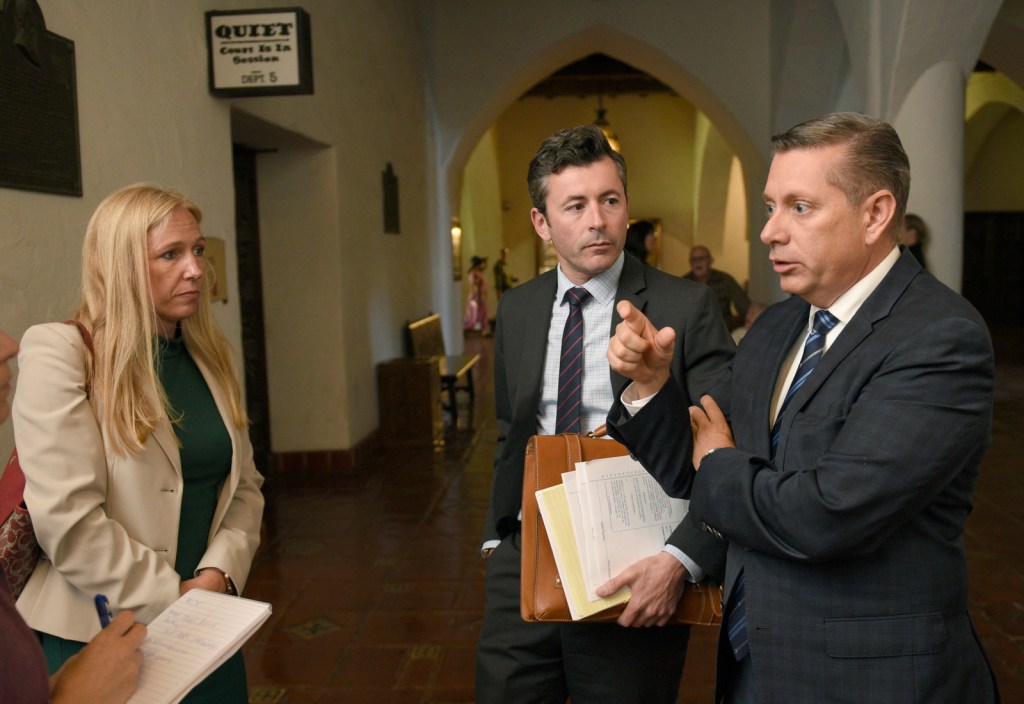Bad things happen to good people sometimes, and when they’re elderly and manipulated by con artists, it’s called elder abuse. The Santa Barbara County District Attorney’s Office has a special unit that investigates and prosecutes elder abuse. For the Taylor couple, 90-year-old Merle and 87-year-old Marilyn Taylor, the DA was able to convict the people who preyed upon them, and in court last week, the Taylors got the last word in a settlement that should help repay the nearly $1 million in debts their grifters cost them.
The financial ball started rolling downhill for the Taylors in 2014 when they received a cold call from Shauna Giliberti, offering to help them prepare a living will. That phone call led to meetings and a friendship. Eventually Giliberti persuaded the Taylors to buy what was known as a “Farmer’s Bond” issued in China in 1925.
Giliberti had told the Taylors about a secret deal: She knew a New York attorney who would soon be cashing in the Chinese bonds at a Zurich bank. Merle Taylor became convinced the ¥250,000 (yuan) bond would result in $5 million or more. (Antiquarians and Securities and Exchange Commission investigators later confirmed that the bond was only worth $1,500 as a collector’s item.)
To buy the bond, Merle Taylor took out a third mortgage on a home he owned on the Mesa in Santa Barbara, a block from City College where he’d been a business professor before retiring. Giliberti’s boyfriend, Dennis Gleason, facilitated the mortgage. Taylor agreed to go in 50/50 with Giliberti and Gleason on the bond, which was sold to him for $105,000, though they never put up any money. By this time, Giliberti and Gleason were living with the Taylors in Lompoc. Witnesses described Giliberti as a personable forty-something with long blonde hair and Gleason as very persistent and sometimes threatening.
The third mortgage was the first of several loans with a series of brokers and lenders that ended with a short-term loan of $950,000 at 11.99 percent interest rate — a loan later described in court documents as “extremely unconscionable.” Along the way, one of the brokers, Robert Houston, added his name to the house, ostensibly because lenders would not otherwise loan to the elderly Taylors. Among the documents Taylor signed was a Grant Deed falsely claiming Houston was the Taylors’ next living relative, and thus entitled to half the Taylors’ property, and another agreeing to pay Houston $15,000 for “services rendered.”
When Houston wanted to sell the Mesa house, valued at around $1 million, the Taylors refused — hoping the Chinese bond would pay off and cover all their debts.
Houston sued them. The Taylors went to the DA.
During the DA’s investigation, the Taylors were always very protective of Giliberti and Gleason. Merle Taylor once said he thought that both had been taken advantage of by the system. According to the DA’s report, it took investigator Jennifer Glimp and Deputy DA Casey Nelson several months, using evidence gained by search warrants, to convince the Taylors that they had been defrauded by the people they trusted.
As for the Taylors, they were unable to refinance the final $950,000 loan and had never been able to meet its payments. Over their objections, that loan had consolidated their existing low-interest debts on the house with the newer loans, which totaled about $800,000, with about $150,000 paid in fees and commissions. The Mesa house was placed on a pending foreclosure. By then the Taylors had retained Santa Barbara attorneys Lacy Taylor and John Thyne III, who were able to delay the foreclosure but unable to prevent it. West Coast Private Investments foreclosed on the house.
In all, at least five people were prosecuted on criminal charges associated with swindling the Taylors. Most received probation, but Gleason never appeared in court and apparently skipped town, as did Houston when he was out on bail. Both have warrants out for their arrest. Giliberti is serving one year in jail for breaking her prior probation terms on an earlier conviction in Ventura for elder abuse.
At a civil trial held in May 2019, the jury decided against Houston and his girlfriend, real estate broker Linda Lukas, as well as Rushmyfile and FMC Lending that facilitated the earlier loans and also profited from the fraud. Andrew Dioli, CEO of the two corporations, admitted to falsifying documents in which he stated that he had conducted a search to find other loan options, as well as falsifying loan disclosure statements, including one stating that Rushmyfile was acting as an agent for the Taylors.
The civil trial itself lasted two and a half weeks. After a day and a half of deliberation, the jury delivered their verdict against the defendants on a Friday. The following Tuesday, the jurors gathered again, this time to consider punitive damages. The Taylors were asking for $1.5 million.
Judge Colleen Sterne, however, announced from the bench that three of the six defendants — Andrew Dioli, FMC Lending, and Rushmyfile Inc., early investors in the Mesa house — had agreed to a settlement. (The seventh defendant, West Coast Private Investments, had settled before trial.) Judge Sterne told the jurors their work was not in vain because their presence during trial had an “extraordinarily crystallizing effect” on the defendants’ minds over the weekend, allowing the settlement. The amount was not disclosed, but the Taylors’ attorney Thyne told the Independent it was “sufficient.”
After the initial May 17 jury verdict, the Taylors admitted they were “very happy.” When asked what they would do with their newly awarded funds, they quickly said, “Get out of debt.” The couple advised others to ask before signing or pursuing new investments. But Thyne added, “Always get a second opinion.”

